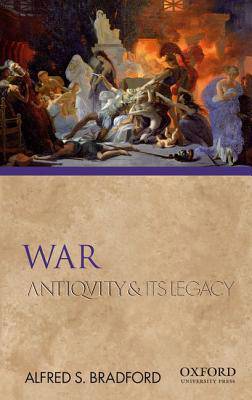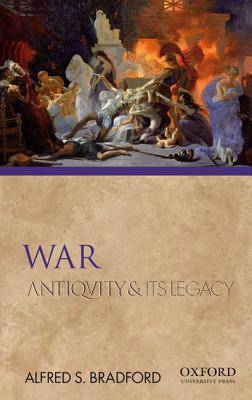
- Afhalen na 1 uur in een winkel met voorraad
- Gratis thuislevering in België vanaf € 30
- Ruim aanbod met 7 miljoen producten
- Afhalen na 1 uur in een winkel met voorraad
- Gratis thuislevering in België vanaf € 30
- Ruim aanbod met 7 miljoen producten
Zoeken
€ 30,95
+ 61 punten
Uitvoering
Omschrijving
By one estimate, humans have fought wars in ninety-four out of every hundred years for the past 5,000. Despite radical differences in the prosecution of warfare between ancient and modern societies, there remains a linear connection to the ways that Greco-Roman cultures thought about war--its conduct, aims, tactics, and ethics. This is epitomized most obviously in the Greek and Latin derivatives that dot our language of war--"army,"military, "strategy." Combining astute analyses of the logistics of conflict with the ethics of war, Alfred Bradford offers fascinating parallels between warfare in ancient and contemporary societies. After a brief prelude that discusses the Greeks' first descriptions of battle in the Iliad, Bradford outlines the changes in warfare from the earliest records through the fall of the Roman Empire to contemporary wars of counterterrorism. The second half of the book turns to discuss more holistically the study of war, the writing of war, and images of war, drawing on a diverse range of texts and images. Fundamentally, Bradford shows that despite massive differences in weaponry and firepower, the basic principles of warfare have remained unchanged over thousands of years, and even as we move further from antiquity, war in the modern age is persistently illuminated by our Greek and Roman forbearers.
Specificaties
Betrokkenen
- Auteur(s):
- Uitgeverij:
Inhoud
- Aantal bladzijden:
- 224
- Taal:
- Engels
- Reeks:
Eigenschappen
- Productcode (EAN):
- 9780195380910
- Verschijningsdatum:
- 1/03/2015
- Uitvoering:
- Paperback
- Formaat:
- Trade paperback (VS)
- Afmetingen:
- 137 mm x 213 mm
- Gewicht:
- 249 g

Alleen bij Standaard Boekhandel
+ 61 punten op je klantenkaart van Standaard Boekhandel
Beoordelingen
We publiceren alleen reviews die voldoen aan de voorwaarden voor reviews. Bekijk onze voorwaarden voor reviews.








